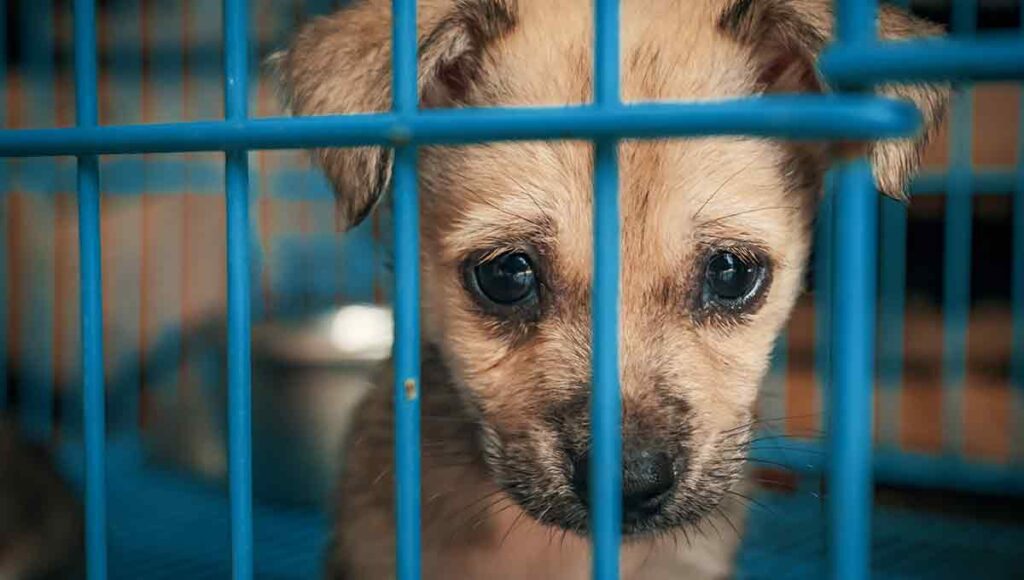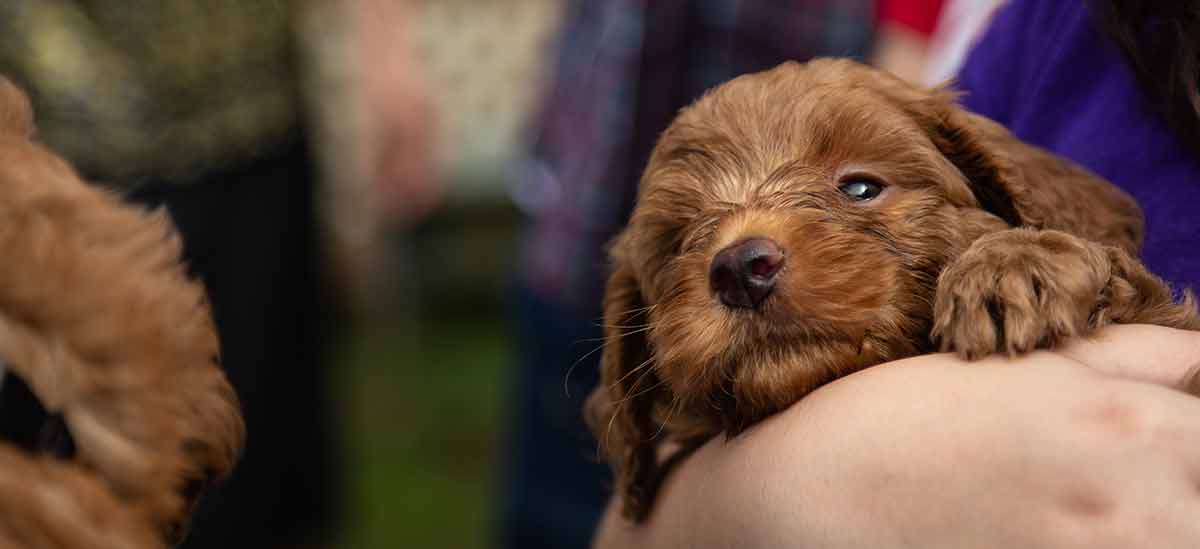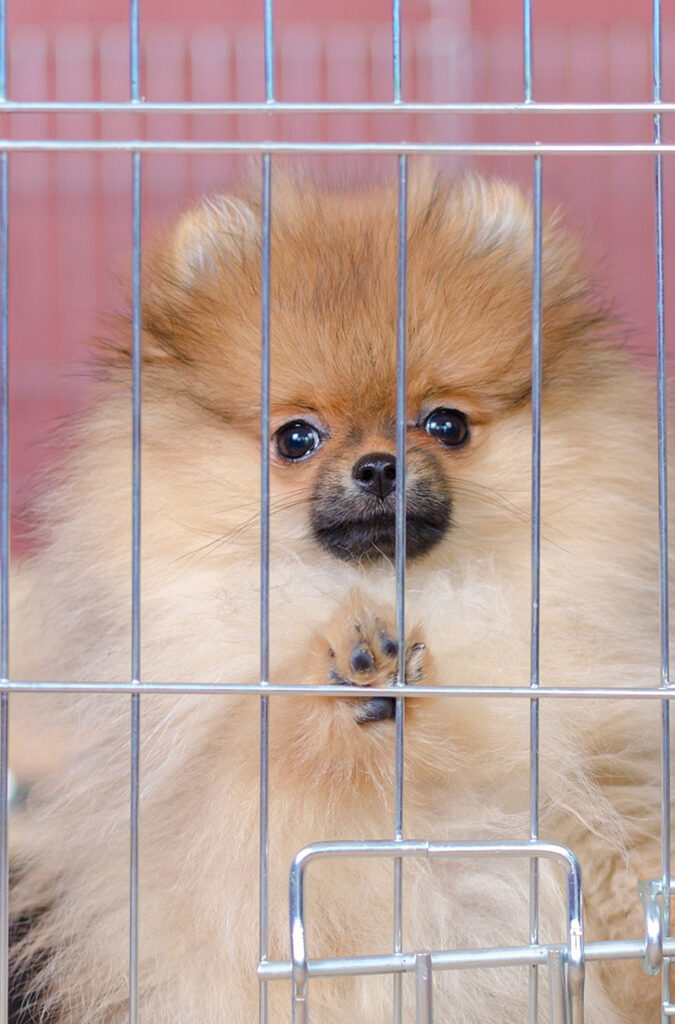
What a nightmare. New puppies are supposed to be a joy, yet here you are at your wits end with a puppy screaming in their crate for hours on end.
You’ve probably been told that you mustn’t let the puppy out while it cries, or it will never learn to be quiet in the crate.
Like all information passed down from generation to generation there’s some truth in that.
But the bigger truth is, learning to be quiet in the crate needs to be done in stages. That advice needs to be taken in context, and a puppy is not capable of learning anything at all when it’s got itself into a complete state.
We’ve got some great tips and games to help restore peace to your world. It’s time to start over, and get this whole crate training, puppy raising, journey back on track. So give your puppy a cuddle and read on.
- The first few days – the ideal start
- Why puppies scream in the crate
- Starting over
- Crate training effectively
- Night time crating
- Alternatives to crating
- Puppy alone time and daycare
- No more screaming – 3 simple steps to success
When I bring a new puppy home, my goal for the first three days is to keep the puppy right next to me. Day and night.
People don’t do this because they worry about making the puppy dependent on them. But it actually does the opposite. It makes the puppy braver and more independent. I want to explain why, so that you don’t worry.
I also don’t want you to worry if you made mistakes. You are only human after all. Your puppy will forgive you, and you can start over.
Making Puppies Feel Safe
Many infant animals, including puppies, are more confident if they have a ‘safe base’ from which to explore the world.
That safe base initially is the puppy’s first home, where they were born and where they lived with their littermates.
When you bring your puppy home that safe base is gone. And the only place the puppy feels safe is right next to the friendly humans that have adopted them. It takes several days, much of the first week in fact, for the puppy’s new home to become their new safe base or den.
A few days is actually pretty fast if you think about it! It would take you and me a lot longer to settle into a completely new environment after being abducted by friendly strangers! But puppies learn fast and are very adaptable.
The Ideal Start
Because your puppy has no safe base yet, when you arrive home with a new puppy they will panic if their human friends leave them alone. In the very beginning, someone needs to be with the puppy at all times.
So it’s best to take your puppy around with you. I even take mine to the bathroom where I leave a few toys on the floor! It’s only for a few days.
Gradually your puppy will start to relax and explore their new environment. Coming back frequently to you, for reassurance.
Obviously you can’t have a puppy attached to your hip for the rest of your life, so teaching the puppy to separate from you starts early, and in little short bursts so that the puppy can adapt without becoming distressed.
Many people want to get crate training underway from the start and that’s fine. But if we are going to avoid the ‘screaming’ it needs to be done in a way that doesn’t trigger distress. In either the puppy or their loving new family!
Why Puppies Scream In The Crate
Puppies scream when they are crated for only a few reasons
- They are frightened
- They need the bathroom
- If they have a history of being crated too often or for too long
- They have been trained to make a noise in exchange for release
Most times, with a young puppy, one of those first three options apply. If your puppy has been with you for less than a week, the first is the most likely. The fourth can happen if a family member or members have gotten into the habit of releasing the puppy from the crate whenever they squeak a bit.
Is It Ok To Leave The Puppy To Scream?
The ‘leave the puppy to yell’ advice is problematic because even if you put the puppy in the crate immediately after a bathroom break (which is a good time to do that) their little bladders fill up pretty fast. And before you know it, the next bathroom break is due. And guess what? The puppy is still yelling…
The only time that leaving a puppy to yell for a while is effective, is if 1, 2, and 3 do not apply.
In other words, you know for sure that:
- The puppy is happy and confident in the crate and goes in there willingly and of their own free will throughout the day.
- The puppy has recently (this is age appropriate) emptied their bladder and bowels.
- You are crating the puppy in an age appropriate manner. We’ll go into that in a minute
If a puppy has good ‘crate confidence’ (we’ll look at that in a moment too) and does not need to pee or poop, and has no history of excessive crating, the puppy will not normally scream in their crate. They may whine a bit in frustration, but provided no-one responds to that, they’ll settle down and relax.
BUT, the chances are, if you are reading this you’ve already been through a few rough days and nights with a puppy screaming and are now in a bit of a muddle.
So let’s talk about how we can get around this cycle of screaming until they need the bathroom, then being let out, and more screaming when they are crated again. Let’s look at next steps for you and your puppy.
Starting Over
With most young puppies, the answer here is to take a step back, and treat the puppy as though you have literally just brought them home. In other words, to start over.
It’s frustrating but it’s a better option than hoping the puppy will just ‘get over it’ and stop making a noise. It’s also a lot less upsetting for both of you. And it’s easier than you might think.

Starting Over
- Rebuild Crate Confidence
- Teach Separation
- Combine
Don’t beat yourself up about what has happened so far. Making mistakes is a part of life. We all do it. The important thing is to recognize those mistakes and get back on track.
With puppies, this is not a big deal. Puppies are very forgiving and while your puppy may now have a negative association with the crate, we can work around that. Let’s start by looking at how an effective crate training program works
Crating Effectively
The main mistake people make with puppies is to try to teach the puppy to be alone or to separate from their humans, inside a crate in which the puppy has no confidence.
Confidence in the crate is the key here. And it needs to come first. You need to get a new puppy going in and out of that crate constantly. Of their own free will. And that means leaving the door open all the time.
With a brand new puppy that is easy to achieve because the crate has no bad associations for them. All you do is divide their daily food ration up into small portions, and scatter a very few pieces of food into the crate when the puppy is not looking.
When the puppy explores the crate it finds the food and eats it. Then it goes to explore some more, eventually returning to the crate where there is yet more food.
Don’t leave a whole heap of food, just literally four or five little pieces of puppy kibble. At the Dogsnet Online Training School we call this the Happy Places game. Play it often!
Make sure that the crate has plenty of soft bedding and soft chew toys in there – the Kong Knots range is a good one.
Do not provide soft bedding anywhere else. And the puppy will soon be returning to the crate and eventually settling down there for a sleep
Night Time Crating
Nightimes should be easier, because you are generally in the same place for several hours. Yet night time crating is where many people come unstuck, and actually end up teaching their puppy to be afraid of the crate.
They make their new puppy a lovely bed in the crate in their kitchen, feed the puppy, put the puppy out for a wee last thing in the evening. Then switch off the light and head upstairs to bed.
A few puppies, maybe one in a hundred, will settle down and go to sleep. A handful of that hundred will whine a bit and then fall asleep. The other ninety puppies will start to cry, the crying will develop into screaming and yet more screaming.
They have been abandoned, tigers may come and eat them. All is lost. ‘Help!’ ‘Help! they scream. ‘Somebody save me’
You know how it goes.
Lights come on up and down the street, neighbours peep through curtains, and you stumble downstairs in the dark to see what’s going on. You are in for a long long night.
This is how it should go:
- Place a sturdy chair next to your bed. Right up against it.
- Place a puppy crate on the chair with the door facing the bed.
- Place the puppy in the crate and get into bed
- Turn out the light.
- Sleep
Take a torch to bed with you. The puppy may wake you in the small hours. Take them out into the yard for a pee and pop them back into the crate. Return to bed and sleep some more.
The puppy should be close enough to smell you, listen to your breathing, and generally just know that it is not alone.
Crating the puppy during the day is trickier if your puppy has already developed a screaming habit. We’ve looked at how effective crating starts with building crate confidence. And that is true even for puppies that now dislike their crate. But it can require some cunning to get the puppy going back into the crate of their own free will again.

My Puppy Hates The Crate Now
If you have made a bad start and your puppy now hates the crate and will have nothing to do with it, you have a slightly longer journey ahead. But you can fix this.
There are a few options
- Desensitize the puppy to the crate
- Get a different type of crate
- Get a playpen instead.
If you are at home a lot and able to supervise your puppy constantly you can manage without a crate. But learning to be crated is an important skill for all dogs, and a good training exercise too. So it’s worth persisting.
Rebuilding Crate Confidence
Desensitizing a puppy to the crate is all about restoring their confidence in the crate as a place of safety.
Rebuilding crate confidence in a puppy that has had an unpleasant experience of being crated takes a little more time, but it can be done. Just start over as you would with a new puppy (see Effective Crating above) and play the Happy Places game multiple times a day.
If the puppy won’t enter the crate at all, place food outside the crate to begin with then gradually make a trail of food that ends inside the crate. Do NOT feed the puppy anywhere else. Their entire daily food ration needs to be dedicated to this game.
You may find this process goes quicker if you switch the crate for a different kind. So if you have a wire crate before, switch it to one of those sturdy plastic ones. And vice versa.
Moving the crate out of your bedroom
You may find you like having your new puppy sleep next to you. And that’s fine! Some people have their puppies sleep next to them for the whole first year. Some for their dog’s whole life. And that’s fine too. It’s your life, your puppy, your choice.
If like me, you find it hard to sleep with a little one snuffling and snoring next to you, then it’s also fine to move the puppy into their own room after those first few days
Alternatives to crating
Remember, you don’t have to use a crate to raise a happy puppy. Generations of puppies survived and thrived before crates were a thing.
But, if you don’t have a crate you will need to have a puppy proof space where your puppy can safely be left alone for short periods. It needs to be a family room – not a bathroom or bedroom. But somewhere that the puppy will be involved with, and learn from, the daily rhythms of your family life.
A kitchen or gated part of downstair area is fine. Use baby gates to prevent your puppy accessing carpet areas or rooms with loose wiring or precious possessions. Even if you do have a crate this kind of puppy zone is invaluable.
If you have space, a puppy playpen is a great idea. And is essential if you intend to leave a young puppy for more than an hour or two at a time. The playpen should have room for a bed, play area, and space to put down puppy pads if you are away from home.
Puppy Alone Time
Teaching a puppy to be alone without fear or anxiety is a process. And that process takes time. It also needs to be started separately from building crate confidence.
We start by leaving the puppy alone in a room, but staying within sight and sound of the puppy. For this you need some kind of barrier that you can step over but the puppy cannot follow. A baby gate is usually ideal.
Each time you step over the barrier drop some food on the floor behind you so that the puppy associates you leaving with fun and pleasure. We call this game ‘Sweet Goodbyes’. And it’s a game we continue throughout the puppy’s first six months of life.
From there you can progress to going out of sight very briefly at first. We go into this in a lot of detail in the Dogsnet Puppy Parenting course. But it’s really a question of building up duration of alone time very slowly.
Combining Alone Time And Crate Time
Once your puppy is comfortable with you leaving them alone for a few minutes and is confidently resting and relaxing in their crate with the door open, you can start to combine the two.
Start by shutting the crate door and then opening it again. Stay next to the crate and increase the time the door remains shut, with you in the room. Once you work your way up to minutes rather than seconds, and especially if your puppy seems concerned, you might want to get a book or your smartphone and sit on a chair next to the crate.
If the puppy protests before you re-open the crate leave the door shut for a shorter time next time, and you can also drop treats through the crate bars while you are next to the puppy to help them adjust to this stage.
Once the puppy is happy with the door being shut while you are in the room you can start to leave the room. For short periods at first, and build up slowly.
Puppy Day Care
It’s important to be aware that young puppies should not be crated for long periods of time, especially on a regular basis. If you work full time, you might want to consider puppy daycare options for when you return to work.
Put The Bowl Away
Getting rid of the puppy’s food bowl is another key to this process. Put it away for the first few months of your puppy’s life and your relationship will be the better for it. My puppies do not have food from a bowl until they are 9-12 months old. Their food is all used in training and/or building great behaviors in the home.
Think about it. A bowl of food fed four or five times a day is four or five opportunities for your puppy to associate you, or wherever you feed them, with something great.
Whereas if you keep puppy food on you at all times, and feed tiny amounts frequently you can quickly build behaviors that you like such as being quiet, keeping paws on the floor, or looking at your face. You’ll have maybe hundreds of opportunities to build your puppy’s attention, love for their crate and multiple great behavior choices. Every single day.
You’ll need a treat bag that attaches to your waist or belt. Put your puppy’s kibble ration in there. Leave a few little pots of puppy kibble around the kitchen for other family members to reward good behaviors
Using food in this way develops a strong bond between you and the puppy very rapidly. Puppies are programmed to bond with ‘providers’. And you are providing, over and over again.
No More Puppy Screaming – Just Three Steps To Crate Success
To sum up, your three steps to success are
- Build crate confidence
- Teach separation
- Combine
Use those games – Happy Places and Sweet Goodbyes to help you. And for more information, checkout my puppy parenting and puppy games courses over at the Dogsnet Training Center.
Good luck with your puppy!

Leave a Reply